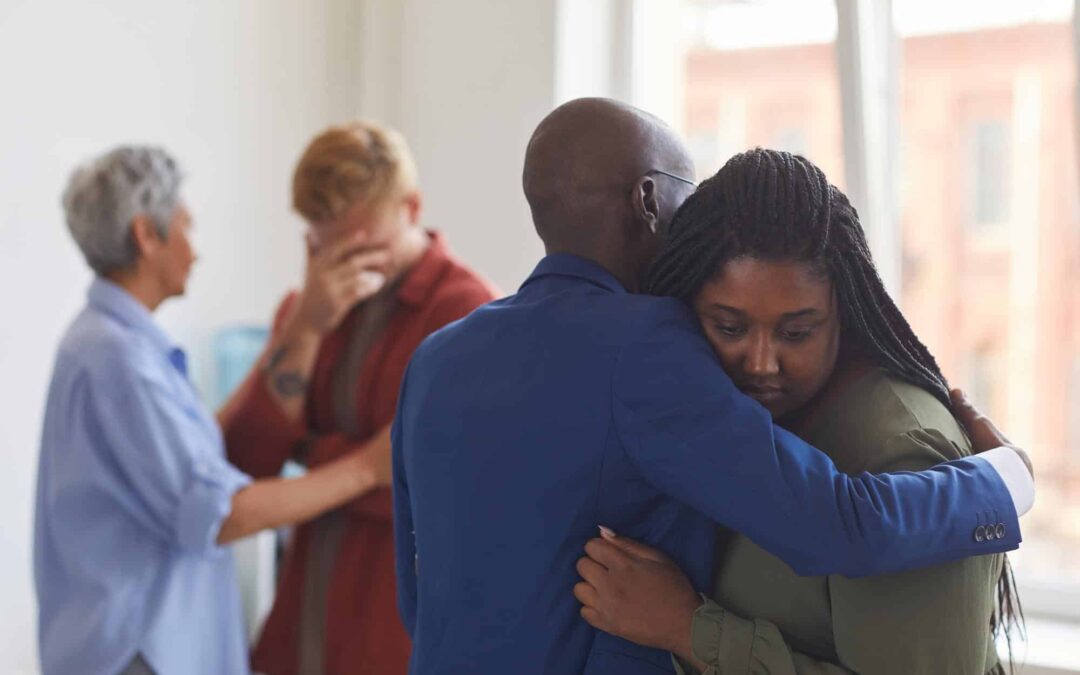The Impact of Addiction on Relationships
Addiction creates deep fractures in intimate relationships, transforming loving partnerships into cycles of pain and mistrust. When substance use enters a relationship, it disrupts the natural flow of emotional connection between partners.
The effects of addiction ripple through every aspect of a couple’s life:
- Emotional Distance: Partners often report feeling isolated and disconnected, as substance use becomes the primary focus of attention
- Trust Breakdown: Repeated lies and broken promises related to substance use erode the foundation of trust
- Financial Strain: Resources meant for shared goals get diverted to sustain addictive behaviors
- Communication Barriers: Substance use impairs genuine dialogue, leading to misunderstandings and conflict
Codependency frequently emerges as partners adapt to addiction’s presence. The non-addicted partner might:
- Enable harmful behaviors while trying to help
- Neglect their own needs to focus on their partner’s addiction
- Develop unhealthy patterns of control or excessive caregiving
The risk of physical and emotional abuse increases significantly in relationships affected by addiction. Substance use can trigger:
- Violent outbursts
- Emotional manipulation
- Unpredictable behavior patterns
- Financial abuse
These dynamics create a complex web of challenges that require professional intervention to address both the addiction and its impact on the relationship.
Benefits of Couples Therapy in Addiction Recovery
Couples therapy serves as a powerful catalyst for healing in addiction recovery. Research based on Gottman’s model shows that relationship satisfaction directly correlates with successful recovery outcomes. When partners engage in therapy together, they develop shared coping strategies and mutual understanding that strengthens their recovery journey.
Key Benefits of Couples Therapy:
- Creates a safe space for both partners to express fears and concerns
- Builds effective communication patterns that support long-term sobriety
- Develops shared recovery goals and accountability systems
- Addresses underlying relationship trauma that may fuel substance use
Therapeutic interventions specifically designed for couples affected by addiction help reduce instances of intimate partner violence. These interventions focus on:
- Anger management techniques
- Conflict resolution skills
- Emotional regulation strategies
- Recognition of abuse patterns
Interestingly, anger can have a positive side in relationships, serving as a door to increasing intimacy when managed correctly. An essential aspect of recovery is integrating family support, which plays a crucial role in substance abuse treatment success. Couples therapy helps partners:
- Identify supportive family members who can aid recovery
- Create boundaries with potentially triggering relationships
- Build a network of understanding friends and relatives
- Establish emergency support protocols
Through structured trauma work and substance abuse treatment approaches, couples learn to navigate challenges together. This collaborative healing process strengthens both individual recovery and relationship bonds, creating a foundation for lasting sobriety.
Behavioral Couples Therapy (BCT): A Specialized Approach for Addicted Partners
Behavioral Couples Therapy (BCT) is a powerful therapeutic approach that addresses both addiction recovery and relationship healing. This specialized treatment combines individual therapy techniques with relationship-focused interventions to create lasting change.
How BCT Works
BCT restructures dysfunctional patterns through targeted exercises:
- Daily Recovery Contract: Partners establish clear agreements about sobriety goals and support mechanisms
- Relationship Enhancement Activities: Scheduled quality time to rebuild emotional connection
- Gottman Rapoport Intervention: Structured communication exercises to resolve conflicts without triggering addictive behaviors
Communication Skills Training in BCT
The communication skills training component of BCT equips couples with practical tools:
- Active listening techniques
- “I” statements for expressing needs
- Time-out protocols during high-stress situations
- Dreams within Conflict intervention to understand underlying hopes and fears
Positive Behavior Change Agreements in BCT
BCT implements positive behavior change agreements that create accountability:
- Regular check-ins about recovery progress
- Shared responsibility for maintaining sobriety
- Reward systems for meeting recovery milestones
- Support partner involvement in treatment decisions
These agreements serve as concrete steps toward rebuilding trust and maintaining recovery momentum. Partners learn to identify and modify behaviors that previously enabled substance use, creating a supportive environment for sustained sobriety.
Setting Boundaries: A Crucial Aspect of Couples Therapy for Addiction Recovery
Establishing clear boundaries is essential for healing in relationships affected by addiction. The Betrayal Model explains how substance abuse damages trust, requiring specific therapeutic interventions to rebuild the relationship.
Key boundary-setting practices include:
- Creating physical and emotional safety parameters
- Defining acceptable behaviors and consequences
- Establishing financial boundaries
- Setting communication guidelines
- Implementing substance-free zones and activities
The Art of the Compromise intervention helps couples negotiate these boundaries while respecting each partner’s recovery needs. You’ll work with your therapist to identify triggers, establish safe spaces, and develop action plans for boundary violations.
Essential elements of trust rebuilding:
- Regular check-ins and accountability measures
- Transparent communication about substance use
- Clear consequences for boundary breaches
- Gradual restoration of privileges
- Recognition of small progress steps
Substance abuse counselors emphasize the importance of maintaining these boundaries consistently. The non-addicted partner learns to protect their well-being while supporting recovery, avoiding enabling behaviors that might hinder progress.
The therapeutic space provides a safe environment to address underlying trauma, attachment issues, and relationship patterns that contribute to addictive behaviors. Both partners receive support in expressing needs, fears, and hopes while maintaining their individual recovery journeys.
Considerations and Challenges in Couples Therapy with Addicted Partners
Couples therapy during addiction recovery requires careful assessment of specific risk factors. You need professional evaluation when:
- Active substance use creates unsafe therapy dynamics
- Physical or emotional abuse exists in the relationship
- One partner shows manipulation or controlling behaviors
- Substance use severity prevents meaningful engagement
Safety Red Flags:
- Threats of violence or self-harm
- Inability to maintain sobriety during sessions
- Extreme power imbalances between partners
- Resistance to individual treatment recommendations
A thorough substance use assessment helps determine if couples therapy is appropriate at your current stage of recovery. Some situations require completing individual treatment or achieving initial sobriety before engaging in relationship work.
Additionally, it’s important to be aware of the risk factors associated with intimate partner violence, as these can significantly impact the therapeutic process and the overall safety of both partners involved.
Specialized Interventions and Support Systems in Couples Therapy for Addiction Recovery
Severe addiction cases often require a multi-faceted treatment approach beyond traditional couples therapy. Individual intensive outpatient treatment provides targeted support for the partner struggling with substance use or process addiction. This specialized care includes:
- Cognitive Behavioral Therapy (CBT) sessions
- Group therapy participation
- Medication-assisted treatment when appropriate
The non-using partner receives dedicated support through:
- Individual counseling to process trauma
- Support groups for families affected by addiction
- Educational resources about addiction dynamics
These interventions work alongside couples therapy to create a comprehensive healing environment. The combination of specialized treatment modalities addresses both relationship dynamics and individual recovery needs, strengthening the foundation for lasting sobriety.
Fostering Healing, Trust, and Healthy Boundaries in Couples Therapy for Addiction Recovery
Building trust requires consistent actions and dedication from both partners. A marriage-friendly therapist guides couples through:
Daily Trust-Building Activities
- Practicing active listening during conflicts
- Following through on commitments
- Sharing recovery progress openly
Boundary Maintenance Strategies
- Setting clear expectations for sobriety
- Identifying triggers and creating response plans
- Respecting personal space and recovery time
The quality of family relationships directly impacts recovery success. Partners learn to:
- Create safe spaces for emotional expression
- Celebrate small victories together
- Support each other’s individual growth
- Maintain healthy social connections outside the relationship
These practices strengthen the foundation for lasting recovery while fostering deeper emotional intimacy between partners.
Resolute Recovery’s Specialized Couples Therapy Programs for Addiction Recovery
At Resolute Recovery, we understand the unique challenges couples face when navigating addiction recovery. Our specialized couples therapy programs combine evidence-based treatment approaches with compassionate care to support both partners through their healing journey.
Our Expert Therapists Are Trained In:
- Behavioral Couples Therapy (BCT) – A proven approach for addressing addiction within relationships
- Trauma-informed care – Essential for couples dealing with complex recovery situations
- Communication skills development – Tools to rebuild trust and strengthen connections
- Boundary-setting techniques – Creating healthy relationship dynamics
We Offer Flexible Treatment Options To Accommodate Your Unique Needs:
- Individual pre-therapy assessments
- Joint therapy sessions
- Crisis intervention support, including steps to take when a loved one relapses
- Ongoing maintenance therapy
Your path to recovery deserves specialized care and attention. Our couples therapy programs create a safe, supportive environment where both partners can work through addiction-related challenges while strengthening their relationship foundation. It’s important to note that therapy plays a crucial role in recovery, serving as a cornerstone of the healing process.
Ready to start your healing journey together? Contact us to learn more about our couples therapy programs for addiction recovery. Our dedicated team is here to guide you through each step of the process, helping you build a stronger, healthier relationship.





